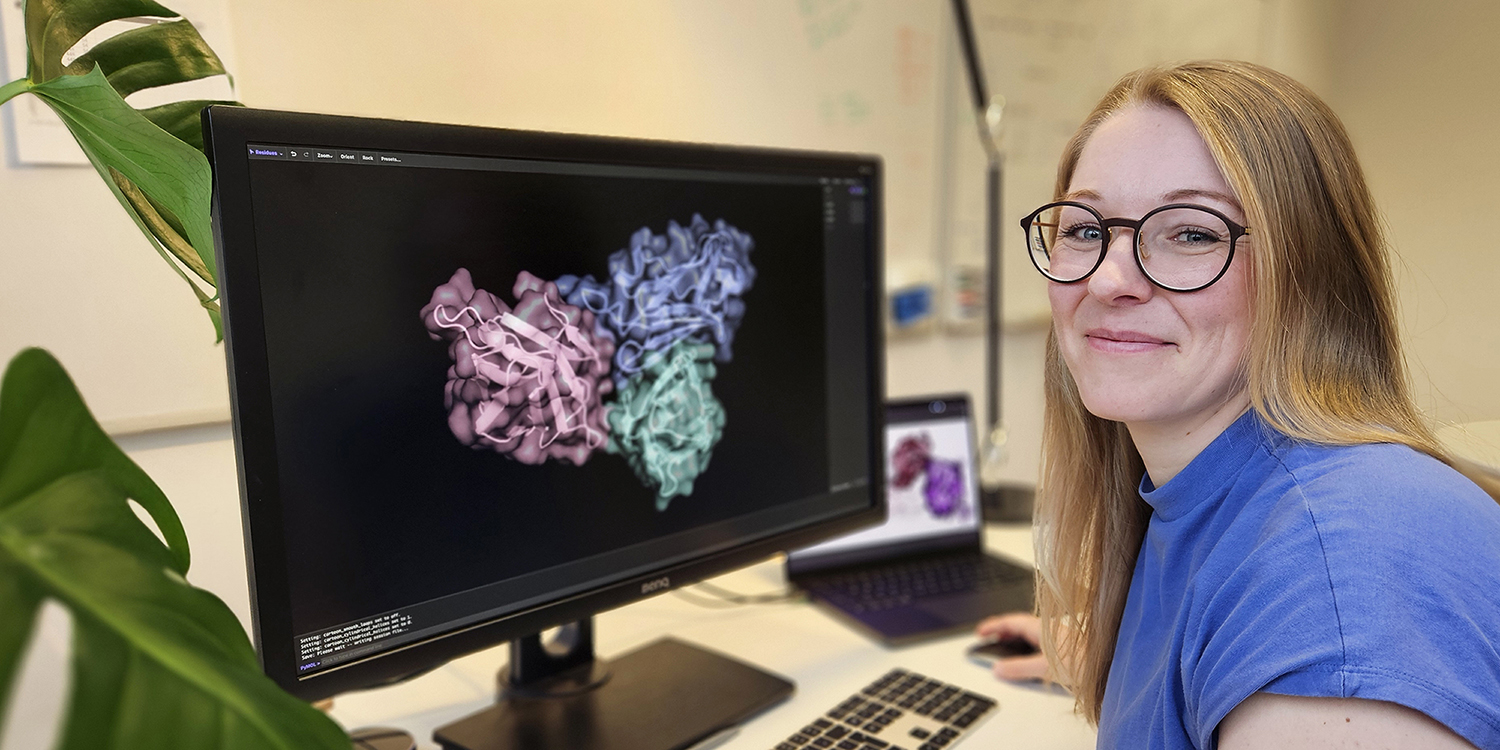
Peptides act as signal mediators in the body and are on the rise as therapeutic agents. However, their full potential can often be limited by rapid degradation and elimination. Nathalie Grob, the new SNSF assistant professor for peptide-based drug discovery, is researching methods to circumvent these limitations and focuses her efforts on targeting diseases with no or unsatisfactory treatment options, primarily those affecting women and girls.
Nathalie Grob has a "retiree's hobby", as she calls it jokingly. The Swiss is a passionate birdwatcher - whether she is hiking, cross-country skiing or just taking a quick look out from her office window between meetings where kites, hawks, and crows glide through the air. Birdwatching is the perfect activity to relax, the new assistant professor for peptide-based drug discovery enthuses, especially during busy times in teaching and research.

In fact, peptide-based drugs are a hot topic now - mostly because of the GLP1 receptor agonists that have achieved a breakthrough in the treatment of diabetes and obesity and are even trending on social media. This example demonstrates the vast market potential of peptides - short chains of amino acid with unique properties - and how they can act as versatile drugs. Peptides are often more selective and more potent than the widely used small molecules (low-molecular compounds with small size) and thus cause fewer side effects.
Nathalie Grob's research focuses on therapeutic peptides, although not on the case mentioned above. Instead, the assistant professor aims to develop strategies for the discovery of new peptide drugs, which, despite their many advantages, still have limitations. Nathalie Grob and her group want to tackle these challenges and outline therapeutic avenues for diseases with limited treatment options that mainly affect women-a personal ambition of the pharmacist, who already, as a student and an active member of the association WiNS, was very committed to women's interests.

Nathalie Grob developed her enthusiasm for peptides during her Master's thesis at Uppsala University in Sweden. There, the pharmacist synthesized variants of Kalata B7, a complex knotted peptide from a plant used to facilitate childbirth in traditional medicine in Central Africa. During her doctorate at ETH Zurich, she decided to stay in peptide chemistry.
"To this day, I find it fascinating that our body only needs 20 amino acids to produce peptides and proteins that regulate all important functions", Grob enthuses. "It's like having Lego bricks in 20 shapes, which can be used to create either a helicopter or a dream house, just depending on the sequence. As a peptide chemist, you control how the molecules are put together and with synthetic methods you can even go beyond the 20 amino acids. That's a great feeling."
Alle-rounders with limitations
Peptides perform key tasks in the body. For example, they can modulate protein-protein interactions - an important class of therapeutic targets, as these regulate vital cell functions and are therefore critical hallmarks of many diseases such as cancer. However, if peptides are to be used therapeutically, an evolutionary biological problem arises.
"Peptides are usually degraded rapidly," Grob explains. "That makes sense because many natural peptides are hormones. They need to be switched on and off instantaneously to be regulated efficiently, for example, by enzymatic scissors. In addition, peptides are easily excreted via the kidneys and often do not remain in the body long enough to exert a therapeutic effect."

Peptide as barcodes
The short half-life of peptides is one of the reasons why most of today's drugs are based on small molecules. Thus, as a postdoc at MIT, Nathalie Grob and her colleague Simon Rössler initially worked on the idea of using peptides as a tool for finding novel small molecules more efficiently ( Rössler et al 2023 ).
"Small molecule libraries are often used in drug discovery. They consist of tens of thousands of archived compounds whose affinity for a specific protein is evaluated. However, to identify a potent compound among thousands by affinity-based selection, it needs a label," Grob explains. "So, we developed the idea for a peptide-based barcode during the lockdown. The attached abiotic peptides can be quickly decoded by common software and thus enable identification of the small-molecule binder."
So far, so useful. However, protein-protein interactions, which often form huge contact surfaces on a molecular scale, are difficult to influence (inhibit or stabilize depending on the disease) with small molecules. Larger, peptide-based drugs would be more suitable. This brought Nathalie Grob - once back from the uncomfortable home office in lockdown - to the central question of how the aforementioned degradation and excretion could be prevented.

Peptide as drugs
Led by Nathalie Grob, researchers at MIT and industry partners in San Francisco finally developed the strategy of "electrophilic scanning" ( Grob et al 2024 ): "To prevent early excretion, the peptide-based drug must be anchored more permanently to the target protein. This can be, for instance, achieved through covalent bonds," Grob explains.
"We have established a tool to quickly find reactive binding sites and build corresponding peptide binders equipped with electrophilic groups. These anchor the peptide-based binder to the target protein via a covalent bond. In the model system, the electrophilic peptide was able to inhibit the desired protein-protein interaction successfully."
However, this method only provides limited protection against enzymatic degradation. Back at ETH Zurich, Nathalie Grob strives to find solutions for this problem. Thanks to an SNSF Starting Grant, she is launching an independent research group and develops new artificial peptides with improved properties: "This way, we hope to obtain active substances that are not so quickly recognized and inactivated by enzymatic degraders in the body."
She aims to apply the new peptides to insufficiently researched diseases and conditions that predominantly affect women and girls.

"Around ten percent of women suffer, for instance, from endometriosis, an extremely painful disease in which endometrial cells grow outside the uterus. Despite the large number of people affected, surprisingly few tools for targeted diagnosis and treatment have been developed. Peptide-based drugs could be part of the solution. We hope to make a valuable contribution with our research."
Prof. Nathalie Grob
Nathalie Grob is currently also giving her first lectures at ETH and is looking forward to working with the students: "I want to help them recognize and develop their strengths." In addition to imparting specialist expertise, she also attaches great importance to promoting key skills such as critical and interdisciplinary thinking, teamwork, and communication of complex interrelationships. "It is important to me that students not only acquire knowledge but also learn how to apply it to pursue their own interests and career goals."

Nathalie Grob earned her degrees in Pharmaceutical Sciences and Pharmacy from the University of Basel. For her MSc thesis, she joined the group of Prof. Ulf Göransson at Uppsala University in Sweden and pursued a PhD at ETH Zürich with Prof. Roger Schibli and Prof. Thomas Mindt, where she worked on the development of radiolabeled peptides for cancer diagnosis and treatment. From 2020-2023, Nathalie Grob was a postdoctoral researcher in the group of Prof. Bradley Pentelute at the Massachusetts Institute of Technology focusing on early-stage drug discovery of small molecules and peptides. 2024 she returned to the D-CHAB to launch a new research group for "peptide-based drug discovery" as an Assistant Professor supported by a Starting Grant of the Swiss National Science Foundation.






